Dear Diary: How Everybody Felt About 2009
Thursday, December 31st, 2009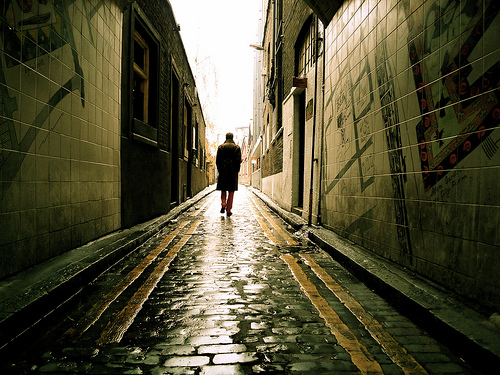
© 2009 Tom Waterhouse
(Except me. I had a great year, really; I was the spring in this guy’s step.)

© 2009 Tom Waterhouse
(Except me. I had a great year, really; I was the spring in this guy’s step.)

Mon ami, Jean-sans-Pnostalgie, has been walking around his natal town (famous from Jeanne d’Arc days) taking pictures. His attempts to make Chinon look like the capital of French lugubriousness aren’t working, at least chez moi. If I’m thinking that I was lucky not to grow up next to an abattoir, it’s only because I know that I’d have gotten into big trouble….

One thing I cannot do: take flashless photographs in the dark. I lack the steady hand. Especially at the end of a party. I offer the above as a tribute to Francis Bacon. And to two great hams.
Let’s see: what happened today? I never made the bed. That never happens unless Kathleen is sick. She wasn’t today, but she didn’t get up until I’d gone to the doctor. I had two appointments — TMI stuff. One of them, really, is so richly TMI that I am sorely tempted to share. Which reminds me, did I ever tell you about the time that Kathleen and I walked into a hotel room, and Kathleen cooed approvingly over the little bronze plaque on her bedside table? “Thank You For Not Sharing,” she said. That’s not what the sign said, but it’s a nice thought. The only way to explain Kathleen’s misreading of “smoking” is wishful thinking.
Then lunch at the Hi Life, followed by an expedition to Agata & Valentina so expensive that I walked out with two tote bags. I wasn’t, strictly, entitled to the second one; the caviar for tomorrow night didn’t quite add up to the threshold. But the other stuff, which I’d put on American Express, more than made up the deficit. I had intended to buy just enough filet mignon to make Beef Stroganoff for the two of us tomorrow night. But Arthur had to make up an entire tenderloin, so, in the holiday spirit, I bought the entire tenderloin.
Back at the building, only one elevator was really working. You don’t want to hear about that, even though my ejaculations elicited some very choice gossip. Risking false imprisonment, I went out again, this time to Gristedes (for the boring stuff, which nonetheless added up impressively) and to Duane Reade (for TMI ointment — c’mon, you’re dying to know. We could play Hangman.) It wasn’t even two o’clock when I came home the second time. License to fritter!
Actually, I did a lot of putting away. Plus, I made madeleines. I wanted to send something to the troops at Kathleen’s office for New Year’s Eve. I understand that pirañas cannot consume a man’s big toe in the time that it takes associates, paralegals, and the odd partner to devour a plate of my madeleines. It’s not the pretty picture that Proust had in mind when he reminisced so famously, but that’s the literary life for you. The cool thing about madeleines now is that I still have the tins that my mother brought back from a trip to France in the Early Seventies, when Making Madeleines was one of those utterly unheard of things that I thought it would be cool to do. I was so far ahead of the crowd that, by the time the lovely little cookie-cakes caught on here (to the extent that they did), I wouldn’t have been caught dead baking a dozen. But I still have the tins, and they turn out very elegant madeleines. Not those big rubbery monstrosities that, par exemple, you can buy in cellophane wrappers from Entenman’s.
Needless to say, I have experimented with a wide range of inauthentic madeleine flavorings. There are many interesting almond variations, but in my dotage I have settled on microplaned lemon zest. Ah, the literary life!
Speaking of which, I wrote up the last two “stories” to appear in The New Yorker. I’m particularly pleased with this, I like to think uncharacteristically dismissive, penultimate line:
Only at the end, when the story collapses into silly misunderstanding faster than a soufflé on a trampoline, does a sense of the second-rate impinge.
The “soufflé on a trampoline” is one of those indulgences that I rarely permit myself. The parallelism is very deficient. But I adore the image. I almost want to rent a trampoline and try it out.
Then Kathleen came home, and we shared a dinner of tomato soup (time to make some more!), lamb chops, sautéed corn, rice, and chocolate chip cookies. I did the washing-up, and here I am, just minutes ahead of this entry’s scheduled entry’s publication.
Almost forgot! I did not run over to Crawford Doyle to pick up a copy (if they had one) of Lauren Grodstein’s A Friend of the Family. I wanted to, though.
Vacation really agrees with me! Hey! How was your day?

There isn’t really any snow out there anymore — it’s too cold for snow — but I haven’t had a chance to take any pictures. Outside the apartment, that is. These banner photos of mine are often pretty awful, but they’re no worse than the visual “thought for the day” that they’re intended to be. Meditate upon slush.
Was yesterday the first day of my vacation, or today? Yesterday was spent mostly cleaning up. So it must have been today. I celebrated by working. I read a mountain of feeds, wrote a few letters, read a learned chapter, reviewed the Book Review, wrote up A Single Man — I used to place links to these productions here, but I’m getting sniffy: if you’re not looking at Portico, then Never Mind. I made a ragù bolognese without having to leave the building, and it was delicious, although it might have been a teeny bit better if I’d thought to use olive oil instead of canola oil. I’m out of canola oil, so I used peanut oil. I dislike olive oil. What can I say? I don’t dislike olive oil nearly as much as I dislike Moby-Dick, but if neither existed then that would be two fewer things to complain about other folks’ liking.
I had a fantasy of knocking off Moby-Dick this week. It’s not going to happen. If it doesn’t happen by the end of January, I promise to give my Library of America copy to someone who would like to have it; I’ve no right to it. I have hated almost every line of the book, hated Melville’s writing. I don’t think that he could write a proper thank-you note, much less a novel. His thinking is the worst mish-mash of bad pseudo-science and King James pabulum imaginable. If this is the Great American Novel, then I’m righter than I think I am about the destinies of the American polity. I do promise that, as soon as I have done with Moby-Dick, one way or the other, I shall never mention it again. They talk of the “Scottish Play.” I’ll refer to the “Nantucket Novel.”
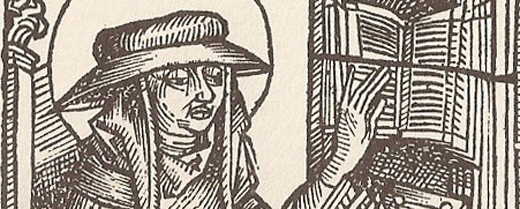
Now that the holiday calendar has come to a close, I’m losing no time in buckling down with the books. Although a few titles in my mammoth stacks of books appeal to me more than others, I resolved this afternoon to read what fate presented, sort of. The first book that my gaze fell upon was Christianity and the Transformation of the Book: Origen, Eusebius, and the Library of Caesarea, by Anthony Grafton and Megan Williams (Belknap, 2006). I bought the book at the Cloisters this summer, and immediately read the substantial introduction and most of the first chapter (of four). Then — well, then there was the Fall, and my life was derailed by an act of reupholstery.
CTB (as I’ll abbreviate the lengthy title) attracted me as a book about books — quite literally in this case, as the authors explore the generally-known but poorly-understood association between the establishment of Christianity and the replacement of the scroll by the codex. As I’m only halfway through the book, I can’t say where the exploration is going to lead, but in the agreeable atmosphere of the Cloisters gift shop it seemed to promise a variation on a story that’s close to my heart: the appropriation of a new technology, for which mainstream society hasn’t found a use, by the exponents of a new cultural outlook. That is why I am reading CBT. I am not terribly interested in the religious aspect of the book as such — except, of course, to the extent that the authors explode the orthodox Vatican view of early Church history, which is entirely a matter of martyrs.
CBT is a diffcult book, but it is aimed at the general reader. It does not assume any detailed knowledge of the early-Christian world of the Third Century, and it conscientiously explains what only specialists might be expected to know. The writing is cogent and lucid. But the scholarship of antiquity, so familiar-seeming from the book’s cover, is actually quite alien. One of the more influential scholars of his time, Origen was, by our standards, not much of a scholar at all, but it is not his Christianity (his belief in the inpsiring Logos) that sets him apart, as one might at first think. It is, precisely, his antiquity. His intellectual formation was in line with that of his pagan contemporaries.
Origen’s bibliographic habits fit well within the philosophical culture of the book as it emerged under the Roman Empire. The contents and scope of Origen’s collection, the uses to which he put his books, the ways he read and the genres in which he chose to write, and the social matrix that supported his work, all find strong parallels among the philosophers. Origen’s library was large and varied, yet its contents were also highly specialized, omitting many works, even entire literary genres, that were central to contemporary learned culture. Origen’s literary output was diverse, but much of it was shaped by the twin philosophical imperatives of interpretation — in Origen’s case, of the Christian Scriptures — and polemic, whether against members of one’s own school or against representatives of rival traditions. Finally, we have precious documentation both for Origen’s relations with patrons and for the concrete ways that their support enabled him to obtain and, especially, to produce books. What we find both reflects, and help us fell out, the pciture pieced together from the evident for more typical philosophers.
That documentation is precious, of course, because there isn’t very much of it, and because “Origen’s library has left no physical traces for archeology to uncover.”
The foregoing passages, taken from the first chapter of CTB, are dense but not distant. Origen’s library is made to sound familiar enough. But once the discussion turns to the Hexapla, the air begins to thin. You might almost wonder if the Hexapla actually existed. The two sets of fragments that survive do not establish the existence of the scholarly project described by Eusebius, Origen’s successor at Caesarea. This was a very emplified bilingual edition of the Hebrew Bible, presented in six parallel columns. The first column gave the Hebrew text, more or less as a list, word by word. The second consisted of a transliteration in the Greek alphabet. The remaining columns offered different Greek translations of the Hebrew Bible, with that of the Septuagint — the official Christian Bible in the Greek-speaking Church— in the fifth column.
Origen’s reasons for undertaking this project appear — by the time the authors draw their conclusions — to have been the very opposite of what you might expect. They seem, for the matter of that, to have been the opposite of Jerome’s. Jerome set himself up in Bethlehem in order to provide the Western Church with a respectable translation of the Hebrew Bible in Latin (the Vulgate). Origen looked through the other end of the telescope. Far from trying to establish a correct Greek testament by scrupulous examination of the Hebrew orignal, Origen seems to have been convinced that the Septuagint was a more “authentic” text than the Hebrew version (“prot0-Masoretic”) that was in use in Hellenized Jewish communities about three centures later. How could it be otherwise? As Origen wrote to Julius Africanus,
Are we to believe that the same Providence which in the sacred Scriptures has taught all the churches of Christ, gave no thought to those bought with a price, for whom Christ died?”
Not very scholarly. This is precisely the sort of thinking that early philologists such as Lorenzo Valla would reject in the 1450s, not because of any doubts about the divinity of Scriptural inspiration, but because of familiarity with the waywardness of pen-wielding human hands.
It was very difficult to fix my attention on this material in the early evening, after a long and bustling weekend. I was distracted by the teasing approaches of a nap, briskly withdrawn whenever I was on the point of surrender. I had to re-read a great deal — or, to put it more exactly, I had to go back and actually read many pages that my eye had grazed. Why, exactly, was I reading this book? Â
Why are you reading this entry?

¶ Kim McCown’s Found Landscapes, which led, irresistibly, to Utilikilts.
¶ Jackson West loses a lot of jobs, not entirely without cooperation.
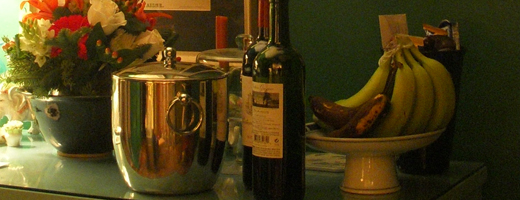
Although there’s a mountain of cleaning-up to do, what I’d really like, tomorrow, is to write thank-you notes to the wonderful people who came to the party.
I had a blast — which undoubtedly means that there are at least ten New Yorkers who are thinking of never speaking to me again. (Aside from Fossil Darling.)
The absolutely coolest thing that happened — well, modesty forbids &c. But I can say, happily, that it involved those lovely little green- and red-jacketed volumes, the Loeb Classics. I quite felt that we were standing upon a peak in Darien.

Here’s hoping that I can still walk tomorrow. My legs are horribly stiff. It hurts a bit to bend them when I sit, but I’m sure that the problem springs from my having stood in the kitchen for hours on end for three days. Let’s hope so. If I’m not a hypochondriac, it’s only because (a) I don’t deserve to survive the insults to my body that have been the hallmark of my lifestyle and (b) I never fear being ill. It’s sudden death that I can feel approaching.
Speaking of sudden death, I walked into the blue room about twenty minutes ago to find that this computer had shut down. It took a while to remember the flickering of the lights in the kitchen not much earlier. Lights don’t flicker here, so I didn’t really pay attention.
Now that I’ve peeled myself off the ceiling, I have to admit that I’m crazy to think that I’m ready to receive friends and relations tomorrow. (Mostly friends.) But there is really nothing more to cook. I wish that it were a little colder (and drier) outside; I fear for the mousses on the balcony.
But the elephant in the room — the elephant in the room is the ghost of an elephant. It is the space that my ambition as a giver of parties used to occupy. I’m looking forward to seeing everyone who visits tomorrow, but if the rain washes my preparations away, I’ll just pop a lot of corn.
I only wish that I felt so relaxed about the electricity. I don’t feature life in a world without that.Â

All the best wishes from our house to yours!
But wait — this is our house? It looks like a hand-tinted postcard from the early days of electric lighting! All that I wanted to do (thank you, PhotoShop) was to turn down the glare of the lampshades. As a result, the “window treatment” looks even more pathetic than usual — it’s so visible!; I see it through Edith Wharton’s eyes. If it were not bolted to the ceiling, I would be in the living room now, tearing it down, instead of doing whatever it is that I am doing.Â
As you can see (yes?), we have not “decorated for the holidays.” In a Where’s-Waldo sort of way, there’s a wreath, but it’s too small to fuss with. So it hangs like a Puritan reproof in an orchard of furbelows.
What has become very interesting about this room for me, since I noticed it the other day, is how little of it Kathleen and I purchased. Almost everything of any size, except for the glass-topped table, the secretary desk, and the (almost invisible) bookshelf/mantelpiece, was either inherited or acquired at no cost. (Fossil realized that he hated the alabaster lamps on the right. My grandmother stitched the needlpoint bellpull, hanging just beyond the farther lamp, for cousins whose eldest daughter, no longer in need of such an appliance, gave it to me.) Kathleen doesn’t think that our way of coming into things is interesting at all. When I pointed it out to her, she called it “the East Coast way.”
I’m not going to pretend that I don’t care what the apartment looks like, but I have to say that I’ve never cared as little about it as I do now. I don’t post today’s image because I want to show off; on the contrary, I really am rather ashamed of all those (very dirty) draperies, not to mention the window treatment (that door!). But: this is home, and I’ve never cared more about that. What the picture shows is a lot of furniture, but what I hear are all the friends who have laughed on the sofas, and joked over the dinner. To all of you who have been with us in this room, I say:Â thanks for the memories!
And I think of the déja vu, for once bankably genuine, that was experienced by a blogging friend who visited the apartment for the first time a few weeks ago. “As photographed…” he said.
But was it?

What made the capon so flavorful and succulent? Could it have been the inedible stuffing?
But was the stuffing — a mixture of chopped apples, chopped prunes, sauerkraut, and breadcrumbs — inedible? I forgot to scoop it out of the bird and serve it. My father-in-law, who gave me the idea, told me that he made it to stuff a goose, back in the Sixties (my father-in-law’s gustatory memory is prodigious). It wasn’t meant to be eaten, he told me. It was intended to flavor the bird, and to soak up some of the fat. When Kathlenn told him how moist the capon was, he attributed it to the sauerkraut, which steams the breast from within.
That makes sense. By the time the sauerkraut would have begun to steam, the skin, which I scrupulously basted every twenty minutes, was crisping nicely into impermeability. Finally, a stuffing to stick with! Perhaps even to eat, if I remember it.
My attention was distracted by the green-bean casserole. For years, I have wanted to recreate this yummy concoction of green beans, almonds, canned onion rings and Campbell’s cream of mushroom soup, without resorting to the mushroom soup. Yesterday, while checking out another recipe in The Way to Cook, I came across the perfect replacement, a mushroom sauce made of béchamel and duxelles. But of course!
The resulting dish (I omitted the almonds, because nuts don’t agree with everyone) was a success. At least, I thought it was. But I can see why it has dropped off menus as cooking standards have improved. Making that mushroom sauce took a while. The mushrooms had to be chopped very fine (boring!), and the milk had to boil just so. It was obviously something that ought to have been done in ahead of time. Memo to Self &c.
Completing the main course were staples of my kitchen: sautéed corn and roasted sweet potatos. The corn is seasoned with oregano and cooked in spoonfuls of butter and oil. I cut five or six sweet potatoes into chunks (bigger than bite-size) and put them in a very large bowl. After tossing them with oil, red wine vinegar, honey, and a liberal amount of crushed rosemary. I turn them into a large baking dish. Whenever I baste the bird, I turn the chunks with a spoon. They’re done in about seventy-five minutes.
Ordinarily, I serve a cream of chestnut soup that New York chef Anne Rosenzweig published on the last page of a Sunday Times Magazine a thousand years ago.  But one of our guests, very understandably, prefers a bland diet at the moment, and chestnut soup might have given her indigestion. I’ve been experimenting with cream of asparagus soup lately, and Kathleen encouraged me to substitute that. I could find a recipe, I’m sure, but I’ve been drawn to experiment primarily by the recurrence of leftover asparagus. Kathleen and I love asparagus, but we can hardly be expected to eat an entire bunch.
First I steam the asparagus, if I haven’t already done that. Meanwhile, I sauté a chopped shallot in a saucepan. To this I add the asparagus and its steaming liquid, along with enough broth to cover the vegetables. Having brought the broth to a simmer, I let reduce the heat and cook it gently for twenty to thirty minutes. Then I purée the vegetables, together with a little broth, in a processor.Â
That’s the basic idea. For this evening’s soup, a misguided frugality impelled me to use the entire spears of asparagus. I won’t do that again, not unless I’m prepared to push the purée through a chinois, because the result is inescapably stringy. I’ll stick to my regular practice of using only the tender tips that snap naturally from the stalks — even though that seems to defeat the whole purpose of the soup, which is to use up scraps of vegetables. Maybe it’s time to check out a real recipe after all.
(For some reason — nothing more cogent that a desire to be “interesting,” I’m afraid — I’ve been adding quarter teaspoons of ground cumin to the simmering broth. Thanks to dumb luck, this actually enhances the result.)Â
For dessert, we had a bûche de Noël from Greenberg’s. Actually, in view of that provenance, and of the unforeseen and inexplicable presence of sliced almonds in the icing (!), I decided to call it a jûche. It was rich and tasty, but it wasn’t quite what we used to buy from Madame Dumas, late of Lexington Avenue. Nothing is forever.

Suddenly, it is the night before the night before Christmas, but you’d never know it from the look of our house. The carols are set to go on the Nano, but haven’t been asked for just yet. There is a stack of Christmas cards to open, but not a very thick one — although I do note that the custom of sending cards seems to have recovered somewhat from the body blow dealt by email and Facebook. As for sending Christmas cards, that’s a two-part operation. First out are the cards to nearby folk whom we hope to see at our open house on the Sunday afternoon between Christmas and New Year’s. All other cards go out after that party. Â
It has been years — over a decade — since gifts had anything to do with our holidays. Everyone we know is positively arteriosclerosed with possessions, and when we see something that we know a friend could use or specially enjoy, we present it then and there. The other day, as the result of a happy accident, we were able to give Fossil Darling a nifty wall clock for his kitchen, which Quatorzse has been renovating (short of the nightmare of new cabinets). But no “shopping” was involved. Whenever I read that someone has been running around with a Christmas list, an activity that seems to involve visiting shopping malls — I can’t tell you how bizarre shopping malls have come to seem in the ten years since I last set foot in one, and how utterly penitential — I feel an almost historical relief, as if I had outlived a barbarous epoch. Just as I, personally, as an ancient Boomer, have outlived the idea that “watching television” is entertaining.
At the same time, it would have been a good idea to go looking for a wreath a few days ago. Hitherto, I didn’t have to go looking; I couldn’t go to the Food Emporium downstairs without passing a temporary forest of Christmas trees. But construction work on the Second Avenue subway has put a stop to that, perhaps for the rest of my natural life. When I spoke to the florist, to order a centerpiece for Christmas Eve dinner (something else that ought to have been attended to earlier), he regretted that he was “clean out” of wreaths. I don’t despair quite yet. If I can’t find one tomorrow afternoon, I shall buy a small tree, and cut it up. I had the wit to save the sturdy iron frame from last year’s.
No doubt because my birthday happens to fall on Twelfth Night, I have always been inclined to think of “the holidays” as the period between just about now and the Epiphany. It does not begin the day after Thanksgiving — nor (horrors!) at Hallowe’en. As a result, we are not sick of the whole thing already. Aside from the little matter of sending out invitations to our party, we have done so little in advance of Christmas Eve that it almost takes us by surprise to hear “God Rest Ye, Merry Gentlemen!” the first time round.
God rest ye, merry readers!

We need something more seasonal for this space — but then isn’t that what the holidays are all about? You can always do better! But what we are trying to do better at the moment is vacation.
¶ Frank Rich’s column about bamboozlers is great, but it might be greater, by stressing the complete failure of media to exert critical authority. The Times itself thinks that this is largely a matter of keeping naughty words off the record. No wonder readership is down.
¶ Handwriting: a new frontier for sentimentalists. Ann Trubek argues persuasively that it has no place in schools. (via The Morning News)
¶ Oy! Why did I wait to make a reservation for my birthday until the day on which Sam Sifton’s three-star review of La Grenouille appeared? Not to worry: the restaurant re-opens after its holiday break on the next day, and we’re down for 7:30. — The Editor.

Nothing would have suited me more than a day spent at home, reading, writing, and making lists of all the things that I have to do. The bit about lists is not a complaint. I quite like making lists. I don’t know the first thing about them, but I like writing them down. You never know when you’re actually going to work your way through one.
But a day at home it was not to be. A print that I bought early last spring was scheduled to come back from the framer this evening. Why did it take so long to frame a picture? It just did. Quatorze was scheduled to hang the picture. I have become utterly dependent upon Quatorze’s picture-hanging skills, especially as my fused neck makes driving nails into the wall very awkward. Hanging the picture, moreover, would require re-hanging all the other pictures in the vicinity. What with chance and coincidence, the day grew a luxuriant schedule before it ever dawned.
I’ll spare you the itinerary. At day’s end, the storage unit was at least two orders of magnitude neater, emptier, and better organized than it was at the beginning. Quatorze and I had had a jolly lunch at the Baker Street Pub, where, frankly, I could happily spend whole days drinking Black & Tans and — well, “eating” is too crude a word for one’s engagement with their cottage fries, which are really pommes soufflées on rustic holiday. We had seen The Young Victoria, a film that, coming as it did on top of last night’s Messiah, left my tear ducts in sore wounded shape.  The new picture was hung, and all the pictures in the vicinity were rehung, except for a drawing of my mother that I made almost forty years ago, and that has lately struck me as in questionable taste. Questionable because I drew it with forty pencils and ninety erasers. Surely no drawing has ever been more overworked.
As for what didn’t get done, ha ha! Did you know that I’m planning to entertain about thirty guests at home on Sunday afternoon? I have not even fixed a menu, much less buttered a cake pan. But I’m not worried, because the theme of this year’s Christmas party is “No Ambition.”
Here’s a look at the new picture. I have had another print by the same artist for about twenty years. Now they face one another across the room I’m writing in. Where, tomorrow, I will spend the day reading, writing, and making lists.
Well, it’s pretty to think so.
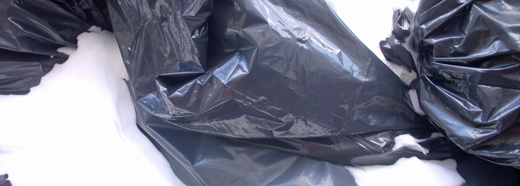
Fürchte dich nicht — I haven’t been buried in a snowdrift. But I have decided to take a vacation. I’ll be posting regularly, yadda yadda.
We attended a superb and, what’s more, interesting performance of Handel’s Messiah this evening. I have never in my life heard a better chorus than Musica Sacra; what a dunce I was not to show up sooner. Still, I missed Mr Mozart; Kent Tritle, as a chorus and organ man, may be forgiven for taking a dim view of Mozart’s occasionally scene-stealing emendations, but straight Handel is rather a like a sandwich without condiments. Don’t mistake me for a sophisticated listener, though; “Glory to God” induced both a minor seizure and major teardrops, and the standing-up at “Hallelujah!”, along with all the other New Yorkers in Carnegie Hall, threw me into such a fit of historical synesthesia that my ears stopped working. We went because Kathleen has wanted to hear a live Messiah for years, and because I finally got over my having “outgrown” such events.
Did I say that the place was packed? Packèd straight. Which reminds me: while we were listening to the Messiah playlist yesterday (four recordings, punctuated by Bach and Vivaldi — very seasonal), it occurred to me to change “the dry land” in the first bass recitative (“…and I will shake the sea and the dry land…”) to “Long Island.” Now, of course, I can’t stop.
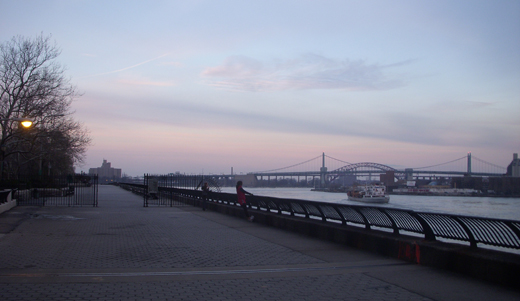
The secret of the day was that I never yielded to the voice that said, “Take it easy. Take the day off. Take the rest of the day off. Rest.” It’s the hardest thing in life — when life isn’t actually hard, that is — to decide when to listen to this voice and when to ignore it. Sometimes, perseverance is foolishness, and it only makes things worse. Yesterday, though, I was in touch with myself, or so it seemed; I could count on what I felt. I had a long list of things to get through, and I got through it.
This is not to say that the voice wasn’t insistent. The day began with dithering. I’d made a date to see A Single Man with Quatorze at eleven. He wouldn’t mind very much if I canceled, but I didn’t like to do it. And that is really the only reason why I went to the movies yesterday. I’d really rather have stayed home.
For once, I left the house in plenty of time. I usually leave in just-enough time, but this means that Quatorze is already there (wherever “there” is) when I show up, and thus I’m at least late for him. I was lucky with the trains. A downtown 6 was pulling out of the station when I got through the turnstiles, but an express came along soon enough for us to pass it at Grand Central — it came in as we left. We passed another train just before 33rd Street. When the express reached Union Square, a local train’s doors were closed just as ours were opened, a virtual insult of sorts. I made my way to the forward tip of the platform. (To minimize travel time to the Angelika from uptown, you want to be in the first car of a 6 Train when it pulls into Bleecker Street. This puts you directly under Houston Street, two blocks east of the theatre. Subway configuration allows you to cover one of these two blocks underground.) Who should appear, just as that train from 33rd Street arrived, but Quatorze himself. It was too cold for walking!Â
To say that I was glad to see Tom Ford’s movie would be wrong, but I might as well say at the outset that, by the end of the day, I was very glad that I had seen it. When the movie was over, I realized that I’d picked up a great deal of very misleading buzz about the film. The combination of waiting for things that weren’t in fact going to happen while acclimating the filmmaker’s extremely dry style was a bit wilting. If someone had straightforwardly assured me that A Single Man is about the loss of a beloved companion, period, then I’d have enjoyed sitting through it a great deal more than I did. I hope that whatever I write about this picture (in the next couple of days, as usual) spares at least one viewer the unnecessary awkwardness of my experience.
Once the false, anticipated Single Man was replaced the actual, viewed oad been replaced by the actual, viewed one, I began to steep in it. As the narrative makes fairly plain near the beginning, George Falconer, the hero of A Single Man, intends this day to be his last. This brings an intensity and zest to his routine experiences that are said to come if you life each day as though it were going to be your last. Many, many worthwhile things would never be undertaken if we all lived as though the day were going to be our last — there would certainly be no literature, not even shopping lists — and I did not go about pretending any such thing. But I let myself get caught up in the draft of the film, increasingly as the day wore on.
There was no time for the long lunch in which Quatorze and I usually indulge after the movies. We boarded a 6 Train at Bleecker Street and rode up to 68th, where we came to ground two blocks south of Neil’s Coffee Shop, mentioned in gossip columnist Liz Smith’s list of eateries that she would miss hanging out in when she retired, and the only one where you would not expect to find a white tablecloth. We sat in the back of the back. Quatorze asked me how the burgers are there, and I ought to have said that I didn’t know. If I had known, I would have told him that they’re like the monsters at Jackson Hole, great mounds of barely bound ground meat that must be eaten with knife and fork. Quatorze offered it up graciously. We did not dally, but paid the bill and walked the two blocks over to Gracious Home.Â
We’ll be here all day if I get talking about Gracious Home. I love Gracious Home, of course, but I’ve come to prefer the quieter (and less exiguous) aisles at the big Feldman’s on Carnegie Hill. I couldn’t be sure, however, that Feldman’s would carry one of the three “musts” on my shopping list (the others being candles and cocktail napkins): a three-way fluorescent light bulb. Three way incandescent bulbs aren’t easy to find, and I’ve never spotted a three-way fluorescent anywhere but at Gracious Home. So Quatorze and I plunged in. Needless to say, we came out with a lot more than those three items. (We even found a nostalgic wall clock for Fossil Darling’s kitchen, which Quatorze has been all-but-renovating.) We were, indeed, carrying too much to carry back to my place on foot.
I made a pot of tea and resolved that Quatorze and I would chat in a civilized manner for an hour, and for an hour only; at four o’clock, I’d change into work clothes and start tidying the bedroom. Quatorze would be perfectly welcome to stay and talk, but I would get to work. I tidy the bedroom on Friday afternoons now so that Kathleen can sleep in on Saturday, or spend the whole day there if she feels it, without holding up domestic routines. (To the extent that they are flexible, domestic routines are onerous.) I calculated that, if I worked briskly, I could get through the bedroom in time to shower and dress and get myself to Crawford Doyle before closing time at six, in order to pick up some books that I’d ordered. Then I would return a DVD to the Video Room, before heading to the Museum for a chamber concert at seven.
Shortly after four o’clock, the teapot was empty, and I got up to refill it. Quatorze decided that it was time for him to head across town to Fossil’s, so I had to decide what to listen to while I dusted and vacuumed. (I had changed the sheets on Thursday night. Pretty soon, I’ll be doing some bit of housework every day, and the pace of life will be more even than it is now. I’m looking forward to that.) In the day’s spirit of just getting on with things, I listened to the large rump of Don Giovanni that I hadn’t heard during last weekend’s housework. I threw on some shorts and went through the bedroom like a white tornado.
Not stopping long enough to think, I dressed and went out and caught a taxi and, no thanks to heavy traffic on 86th Street, got to Crawford Doyle at 5:50, in time to collect my books. Then I walked three blocks in the wrong direction (from the Museum) and returned Four Christmases, which Kathleen and I had watched for the first time the night before; in exchange, I picked up Cheri, which I also hadn’t seen. It was at this point that thinking functions kicked in, and I realized that I had never blown out the scented votive candle in the bedroom that I light whenever I’m cleaning the room. What could happen? But I was wracked by the disapproval that both Kathleen and Quatorze would voice if they knew. So I had to go back home, which I did on foot. I blew out the candle, bundled up the laundry, took an ancient chicken pot pie from Eli’s out of the freezer, and popped it into the oven (200º — what could happen?). I took the laundry down to the valet and went out to hail another cab. This time, there was no traffic, so I had time to troll the Museum bookstore. I’d have been happier to miss this part of the day. On the sale tables, I saw only books that I have already bought but not opened. It was disgusting.
The chamber recital will also be written up elsewhere, but, if you don’t mind, I’ll anticipate. Perhaps because of A Single Man, I sensed a valedictory note throughout the evening, as if this were the final appearance of the Metropolitan Museum Artists in Concert. For the first time in my experience, Edward Arron, the cellist who serves as the group’s artistic coordinator, made no preliminary or explanatory remarks; he didn’t say anything at all. The first half of the program jiggered between the interesting and the extraordinary (more anon); I had dithered about going to the concert just as I’d dithered about the movie, and once again I had decided that I owed it other people (in this case the musicians) to show up. If I had taken the trouble to preview the program, though, I might well have stayed home. The program lacked shelf appeal for me. Happily, I didn’t take the trouble, so there I was in my seat, after the interval, for a magnificent performance of music that I don’t really know, the first of Fauré’s two piano quartets. Was it just the hangover of Tom Ford’s movie that made this genially exquisite masterpiece sound like exactly the right choice for a final presentation? I’d have been in tears, if the day hadn’t become an object lesson in pleasure and good fortune. While the concert lasted, I enjoyed it. I’d worry about future events later.
As I left the Museum in the floodlighted, frigid air, I left my gloves in my pocket while I called Kathleen and arranged to meet her at the New Panorama for dinner. It did not seem that life could get any better than this, and yet I knew that it was as good as it was precisely because there had been earlier moments that pointed in the same direction. We enjoy and love life because we have enjoyed and loved it. If you live long enough, the love that you have lost teaches you how to love what you have.
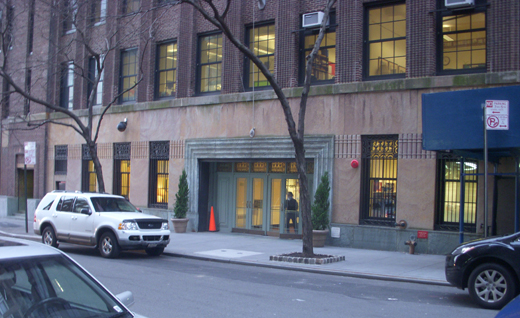
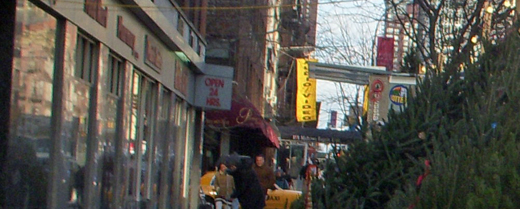
¶ Matins: Have a look at the impact of the “recession” on Ohio’s manufacturing towns. Unemployment is a national disgrace created by overzealous faith. Government may screw things up from time to time, but nobody beats financiers at catastrophe creation. (Washington Post; via MetaFilter)
¶ Lauds: Shipley, meet Ripley. Sigourney Weaver talks to Speakeasy about Avatar. She finishes with a Trick-or-Treat TREAT.
¶ Prime: British banking authorities plan to do away with checking by 2018. Our one venture in online bill-paying was a very, very expensive fiasco. We don’t write very many checks, though. (Yahoo; via Marginal Revolution)
¶ Tierce: Four really backward-looking road-construction projects. No new roads! Not for trucks and automobiles, anyway. (The Infrastructurist)
¶ Sext: In a case of what sounds like the most irregular theorizing, psychologist Peter Lovatt hypothesizes that the awkward dancing of middle-aged men serves an evolutionary purpose. All right, class. We can stop giggling now and get back to work. (Telegraph; via Arts Journal)
¶ Nones: In the Chronicle of Higher Education: “Scholars Nostalgic for the Old South Study the Virtues of Secession, Quietly.” We used to think that the United States was wrong not to let the South go in 1861. Now, we’re more inclined to think that the Northeast was wrong to remain within the Union. (via The Morning News)
¶ Vespers: In this time of Best-Of lists (the year, the decade), it’s refreshing to read descriptions of nine not so very well-known books of relatively recent date that the contributors to The Second Pass think might well be highly regarded in 2110. We were particularly taken with Jon Fasman’s lines on the one book that we have read, Kazuo Ishiguro’s The Unconsoled.Â
We don’t disagree. We love thinking that there will still be books in 2110 — especially after reading Helen Simpson’s “Diary of an Interesting Year” in The New Yorker.
¶ Compline: For the final Daily Office entry for 2009, we turn to that bastion of fun, The Awl, for Joel Johnson’s response to the Cringely’s cringe-worthy Christmas card, which we decided not to write up yesterday.
And happy holidays as well! We’ll be back on Monday, 11 January 2010.

This afternoon, I popped into the Video Room — I was passing by — and rented a recent picture that I haven’t seen, Four Christmases. Kathleen and I watched it after dinner, and liked it very much; I expect that I’ll buy the DVD. Vince Vaughn’s ability to talk himself into and out of sticky situtations simultaneously can’t be beat. As for his co-star, we couldn’t put our finger on what Reese Witherspoon was doing, exactly, but it was different, and it seemed very smart. The two actors were as superior to the material as their characters were to their families.
“Family” has always been a touchy subject for me. My latest theory is that I didn’t have one. I had something else — whether or not it was good or bad makes no difference, because it wasn’t family. I can’t attribute this alternative structure to adoption. I’ve never known an adopted person who was wholly at home in his or her new family, but because I read about such people rather often, I’ve decided to reserve judgment. So I’ll pin it on a notion of “adoption plus.” There was something else going on — or, more likely, not going on.
It suddenly occurs to me that “family” is a word that I never heard my father utter — not, I mean, in the adhesive sense. I have just begin thinking, actually, of my father’s silences, his discretions, the things that it didn’t occur to him to say. For a nice guy, he was remarkably honest. It has also occurred to me lately that he was not really keen on the family/parenting thing. Left to his own devices, he’d have been happy without nephews and nieces, much less a son and a daughter. He was famous for having nothing to say to kiddies.
We let each other down, my father and I. He moved us to Houston, in 1968. I never forgave that. I still haven’t. What a terrible thing to do to me — Houston! Conscientiously thoughtless it was it was. I paid him back, in 1980, by refusing to return to Houston after law school. That had been his idea of the deal, not only paying the tuition but getting me into the one non-Southwestern school that I was allowed to apply to. I hadn’t agreed to this deal, but I’d known that it was what he wanted. And yet I was hardly some captive child. I was nearly thirty, and yet every bit as incapable of taking care of myself as he feared I was. But I took good enough care of myself to make sure that I never went back to Texas.
Texas, once the largest state (territorially) in the Union, is a manifold place. I like to point out that it retains the power unilaterally — without permission from Washington — to subdivide into a total of six states. That Texans have failed to avail themselves of this magical multiplication of senators does not make them more impressive to me, I assure you. When I say “Texas,” I’m well aware of the differences between the three great cities, and between each of them and the vast hinterlands in which they’re embedded. Nonetheless, when I say that I wish that Texas did not exist, I’m talking about all of those complexities. The place is not devoid of interest. But it is devoid, for me, of whatever a territory might have to inspire a patriotic response. What I learned in Texas was that I disliked it, deeply.
My feelings about upstate New York (what I call “New York State“) are not much warmer, by the way, than my feelings about Texas. I’m sure that, if I had ever been obliged to live in Syracuse or Rochester, I would have hated it even more than Houston. I didn’t much like the town I grew up in, for the matter of that; but it had the advantage of a train station famously sixteen miles north of Times Square.
As for my feelings about my family, they consist primarily of doubting that I am capable of love at all. Loving anybody, that is. I could not love them. The notion of “family” just reminds me of my resentment, felt for so long (but no longer) that nobody asked me to choose these adopters.Â

¶ Sand Castles deplode (MetaFilter)
¶ Tyne Tobacco (Amassblog)
¶ Dig We Must (New York; via Joe.My.God)